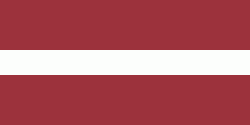Ogre (Ogre)
 |
 |
Ogre is composed of three parts: Jaunogre (meaning "New Ogre"), Ogre (the center of the city), and Pārogre (meaning "Ogre across [the river]" though not all of the named region is across the river).
The name of the city comes from the Ogre river. The Ogre village was first mentioned in 1206, called "Oger" in German. In 1861, when a railway Riga–Daugavpils was built, Riga's residents started to build summer cottages here. In 1862 Ogre became a health resort.
The city's coat of arms was granted in 1938 and shows the beautiful river and pinewoods of Ogre. There is a cultural centre, an art school and a music school in Ogre. It has three Latvian language schools, and one Russian language school — Jaunogre Secondary School.
The city also has a cemetery with the remains of German soldiers who died during the First and Second World Wars, or died in captivity between 1944 and 1951.
Ogre is the homecity for most recent (2016/17) Latvian ice hockey champions HK Kurbads.
There are three main versions of the etymology of Ogre's name (both town and river). The first states that the name of the river from which this city derives its name is of Russian origin (угри, ugri, meaning "eels") because there used to be many eels in the river Ogre. A popular folk legend says that Catherine the Great of Russia was the one who gave the river this name because there were a lot of eels in the river; however, this lacks any evidence. Whereas Estonian linguist Paul Alvre takes into consideration an older form of the Ogre river's name (Wogene, Woga) first found in Livonian Chronicle of Henry (1180–1227), and argues that it cognates with Estonian word voog (with possible meanings: "stream, flow, waves"), therefore showing connection with Finno-Ugric languages, most probably early Livonian language.
A third etymology gives a reconstructed form *Vingrē, related to Lithuanian vingrùs, "meandering, curly" or Latvian vingrs, "nimble;" thus meaning "the meandering river"; the village of Engure has the same root.
Map - Ogre (Ogre)
Map
Country - Latvia
 |
 |
| Flag of Latvia | |
After centuries of Teutonic, Swedish, Polish-Lithuanian and Russian rule, which was mainly executed by the local Baltic German aristocracy, the independent Republic of Latvia was established on 18 November 1918 when it broke away from the German Empire and declared independence in the aftermath of World War I. However, by the 1930s the country became increasingly autocratic after the coup in 1934 establishing an authoritarian regime under Kārlis Ulmanis. The country's de facto independence was interrupted at the outset of World War II, beginning with Latvia's forcible incorporation into the Soviet Union, followed by the invasion and occupation by Nazi Germany in 1941, and the re-occupation by the Soviets in 1944 to form the Latvian SSR for the next 45 years. As a result of extensive immigration during the Soviet occupation, ethnic Russians became the most prominent minority in the country, now constituting nearly a quarter of the population. The peaceful Singing Revolution started in 1987, and ended with the restoration of de facto independence on 21 August 1991. Since then, Latvia has been a democratic unitary parliamentary republic.
Currency / Language
| ISO | Currency | Symbol | Significant figures |
|---|---|---|---|
| EUR | Euro | € | 2 |
| ISO | Language |
|---|---|
| LV | Latvian language |
| LT | Lithuanian language |
| RU | Russian language |















